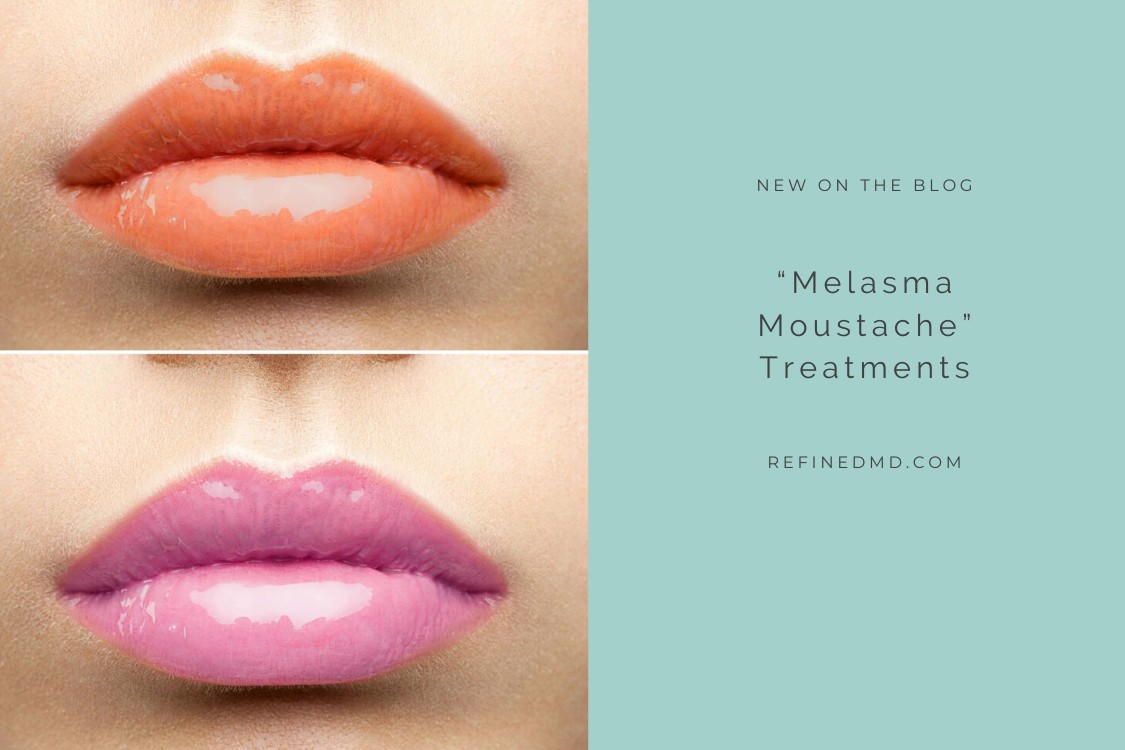
19 Jan “Melasma Moustache” Treatments
Many medical and dermatological skin conditions also have a cosmetic component, including melasma. This is a stubborn type of hyperpigmentation that can be triggered by exposure to the sun, making those who live in California especially prone to struggling with this condition year-round. Sunscreen can help prevent melasma (and, more importantly, can protect against UV damage that can lead to skin cancer), but it’s not foolproof.
Melasma is often called the “mask of pregnancy” because pregnancy hormones can also trigger melasma, leading to a presentation akin to a “mask” under the eyes and across the bridge of the nose. However, there’s also “melasma moustache.” When this occurs, melasma presents as a dark brown or gray-colored ‘stache along the upper lip. It can be triggered and exacerbated by sun exposure. Women are already much more likely to get melasma than men (yes, men can have it, too), and for many the melasma moustache is the worst place to have hyperpigmentation since it can very much look like a real moustache—but one that can’t be shaved. Fortunately, there are some solutions.
The Melasma Mess
The good news is that melasma isn’t physically dangerous. It’s not a sign of a more serious illness and is not related to skin cancer. Instead, it’s something that happens when there is hyperactivity of melanocytes, which produce melanin, in the skin. Those with darker skin tones can get melasma, but it may not be as visible (or visible at all). In addition to sun exposure and hormones, certain medications and a family history of melasma can also increase your odds of developing it. In some rare cases, systemic diseases such as thyroid issues can trigger melasma, but this is rare.
A combination of triggers, such as sun exposure coupled with pregnancy, can skyrocket your chances of developing a melasma moustache—or any other melasma presentation. Most people get melasma somewhere on their face, though sometimes it can appear on the neck. A melasma moustache does not cause swelling or discomfort, and is instead an asymptomatic condition. Women aged 20 – 40 years old are most likely to get melasma thanks to levels of estrogen and progesterone in their bodies. It is estimated that 15 – 50 percent of pregnant women experience some degree of melasma, also known as “chloasma” in pregnant people.
Preventing and Treating Melasma
Melasma is one of the most difficult types of hyperpigmentation to treat, so preventing it is ideal. The only way to prevent melasma is to take measures to avoid common triggers. This means wearing medical-grade sunscreen with an SPF of at least 30 any time you’re exposed to UV rays (including during commutes or working by a window). Additional sun protection tools like wide-brimmed hats and avoiding peak sun hours (typically between 10am – 2 pm) can also help. However, sometimes there’s no avoiding melasma. When this happens, getting the right treatment is essential.
The first step is a correct diagnosis, which you can get at RefinedMD. Although there is no “cure” for melasma, it will eventually go away on its own and there are procedures to decrease its appearance. Chemical peels, laser skin rejuvenation, and microneedling are the three most effective treatments for melasma. You may also be matched with a medical-grade topical, such as a serum rich in Vitamin C, to further lighten the melasma signs. However, do bear in mind that if you get melasma once, it can reoccur.
Skin Conditions as Cosmetic Concerns
Even though melasma moustache is completely benign, it can do a number on your self-esteem. Hyperpigmentation overall is also a sign of aging, just as much so as lines and wrinkles. If you want to look and feel your best, it’s paramount to take care of the skin you’re in. Our skin is our largest organ, and with over 3,000 dermatological conditions it’s likely that you will face a few in your life.
Skin care experts can help you tackle current skin woes, properly care for your skin, and prevent future issues. To schedule your consultation for melasma or any skin condition, get in touch with RefinedMD today by calling the office or filling out the online contact form right now.
